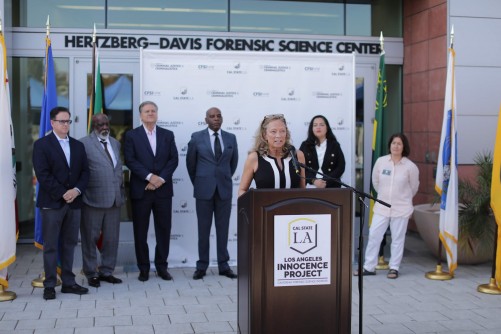Newswise — After serving 38 years in prison for a crime he didn't commit, Maurice Hastings was declared innocent on March 1, 2023—a decision that followed an October 2022 court order overturning his conviction. This victory was won through the advocacy efforts of the Los Angeles Innocence Project, a nonprofit based at Cal State LA working in partnership with the university's California Forensic Science Institute (CFSI).
“He's waited almost 40 years for this truth to come out, and it taught many lessons to everybody in the crime lab, in our project and at the DA's office," says Paula Mitchell, director of the Los Angeles Innocence Project. “These mistakes happen, and they're very serious. Had the jury come out a different way during the penalty phase and decided that Mr. Hastings should be executed, you have to wonder whether he would even still be here and able to challenge his conviction. It's a cautionary tale that explains in dramatic fashion why if there's evidence available for testing, no stone should be left unturned in terms of subjecting it to the most rigorous testing that we have available to us now."
In Hastings's case, Los Angeles Innocence Project attorneys were able to locate and test the DNA evidence taken from the 1983 crime, which was then connected to another individual who had been found guilty of other, similar crimes around the same time.
Coming Together
The Los Angeles Innocence Project formally launched in August 2022, bringing together a multi-disciplinary team of litigators and lawyers, exoneree advisors who have had their wrongful convictions overturned, and faculty and students from CFSI and the Cal State LA School of Criminal Justice and Criminalistics to conduct this level of investigation into wrongful conviction cases. It is the first innocence organization to be affiliated with an academic forensic science program.
While the project was only recently formalized, the partnership began about five years ago when Mitchell first collaborated with Katherine Roberts, Ph.D., director of Cal State LA's criminalistics graduate program and CFSI executive director, to secure a federal U.S. Department of Justice grant to conduct postconviction DNA testing. The funds have since supported work in wrongful conviction cases, including Hastings's case.
“We are uniquely positioned now to look into cases that are 20, 30, and even sometimes 40 years old," Mitchell says. “When we look at those cases, we find sometimes that the forensic evidence presented in the courtroom all of those years and decades ago doesn't hold up anymore because technology is more advanced or we have better methods now."
To achieve the Los Angeles Innocence Project’s goals, faculty and students at CFSI review police reports, evidence, transcripts and other records as well as locate evidence and determine if DNA testing could provide probative evidence. They then provide recommendations to the team of lawyers about how to move forward on the case, which can involve requesting that forensic evidence be reexamined, tested or retested using current technologies. The legal team is responsible for presenting the findings to the criminal legal system to work toward the exonerations of wrongfully convicted individuals.
“Our team approach model for the postconviction grant includes legal and forensic practitioners working in unison with forensic academic faculty and graduate students over the two-year period of the Department of Justice funding years," Dr. Roberts says. The team also aims to review 10 to 15 violent felony offense cases during that time, she adds.
The Los Angeles Innocence Project’s efforts go beyond DNA forensic evidence, however, to look at other factors that can lead to wrongful convictions. Most recently, the project’s lawyers provided assistance in a seven-week murder trial that resulted in a not guilty verdict. The individual was first convicted on a false confession, but was retried after the conviction was overturned.
Learning Opportunity
Through its work, the Los Angeles Innocence Project is also positioned to offer greater learning opportunities that can ultimately improve the criminal justice system.
First, Cal State LA criminalistics graduate students are involved in the CFSI case reviews in which they examine and evaluate the testing procedures that were used at the time of the trial. They also determine if retesting DNA could result in a conviction being overturned and provide subject knowledge to the legal team. One graduate student has even joined the lawyers as they interviewed a client in prison. Additionally, the School of Criminal Justice and Criminalistics is piloting a service-learning class on wrongful convictions for criminal justice undergraduate students.
“We are working with the next generation of criminalists and have an opportunity to train them," Mitchell says. “It's important to connect these dots for students who are in school, learning how to make the world a better place and trying to figure out their career trajectory. … It has hit home for them how critically important it is for criminalists to testify truthfully, fully and honestly about what laboratory testing can and cannot show."
Finally, the Los Angeles Innocence Project has developed a questionnaire for potential clients that asks for information about their case, such as their demographic data or the attorneys, prosecutors and judges involved. The information allows the project to create a database on cases to review that can also reveal systemic problems that lead to wrongful convictions. This data helps increase understanding among lawyers around reliable forensic evidence and provide a platform for advocating for policy changes to better protect the accused.
“Our goal is to ultimately have fewer wrongful convictions in the first place," Mitchell says. “It's important to keep in mind how much the criminal legal system has changed as a result of the systemic errors that have been uncovered over the innocence work that's been done over the last 30 years."
Learn more about the Los Angeles Innocence Project, and consider donating to its work.

